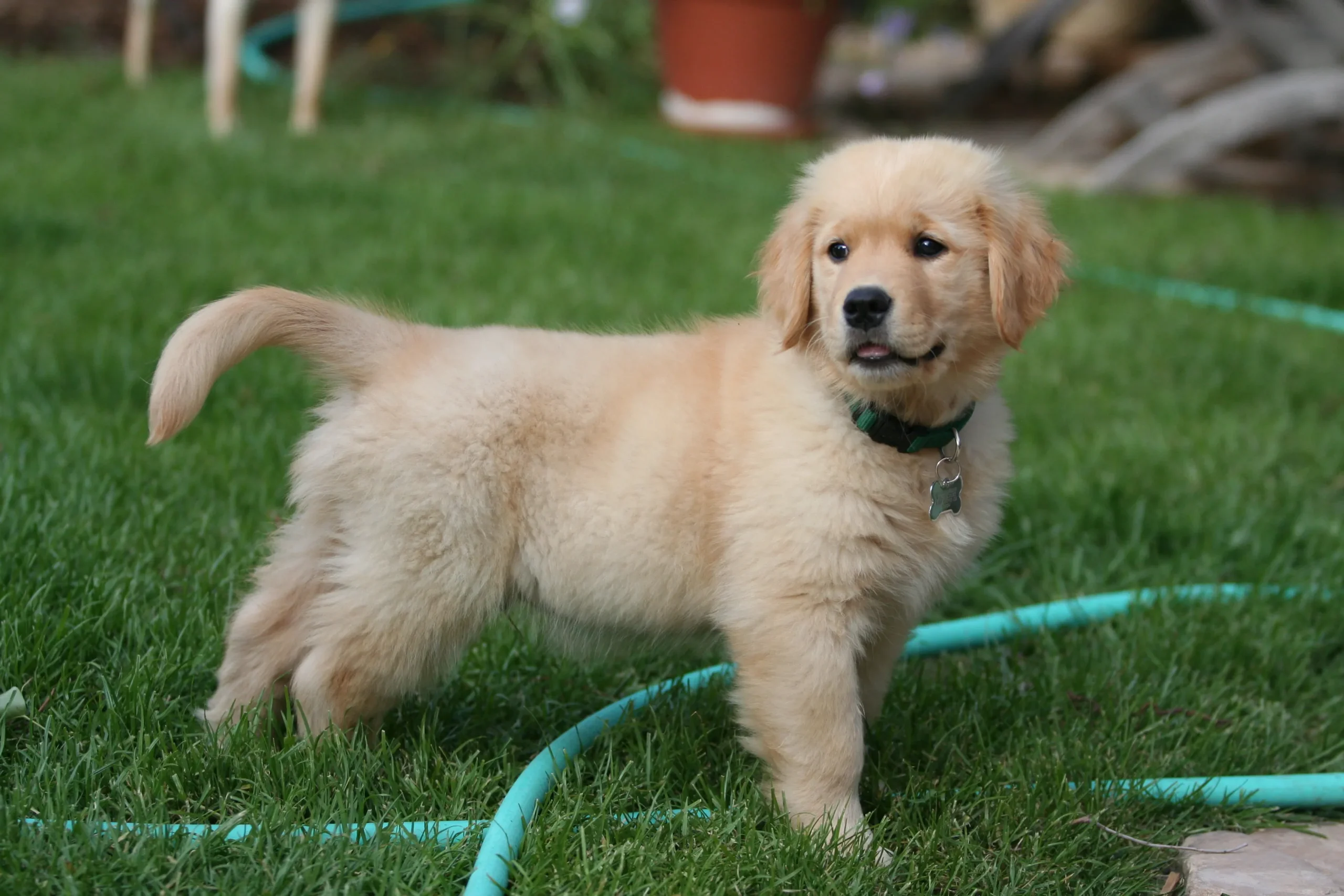Stop Your Golden Retriever from Digging: Expert Tips for New Dog Owners
If you’re a proud new owner of a golden retriever, you might be starting to realize that their love for digging can be quite frustrating. But before you go scolding your furry friend, it’s important to understand why this behavior happens in the first place.
Luckily, there are proven training techniques and alternative activities that can prevent your golden retriever from turning your backyard into a warzone of holes. We’ll dive into all of these strategies, including creating a designated digging area and consistent positive reinforcement, so you can finally enjoy a peaceful backyard with your loyal companion.
As someone who has worked with thousands of dogs, both through shelters and breeders, I’ve seen it all. So trust me when I say that these tips will work wonders for your golden retriever. Keep reading to learn how to stop their digging behavior for good.
Understanding the reasons behind your Golden Retriever’s digging behavior.
Understanding the reasons behind your golden retriever’s digging behavior is crucial in order to effectively address and prevent this unwanted behavior. As someone who has worked with thousands of dogs through dog shelters and breeders, I have seen firsthand how digging can cause frustration for both the owner and the dog.
Firstly, it’s important to understand that digging is a natural instinct for many dogs, including golden retrievers. In their wild ancestors, digging was necessary for survival – whether it be creating a den or burying food. This primal urge can still manifest in our domesticated pets today.
Secondly, boredom or lack of stimulation can also trigger your golden retriever’s desire to dig. Like humans, dogs need mental and physical exercise in order to maintain good health and well-being. If they are not provided with enough opportunities for playtime or exploration outside of their regular routine (such as walks), they may resort to destructive behaviors like digging.
Thirdly, anxiety or stress can also contribute to your golden retriever’s tendency towards excessive digging behavior. Dogs may dig as a means of coping with feelings of fear or discomfort – much like how humans might fidget when nervous.
So what steps can you take as an owner? Firstly provide ample opportunities for physical activity- such as daily walks/runs/jogs/playing fetch etc., Secondly give them toys that stimulate their senses- chew toys/ball games/toys where treats are hidden inside etc., Lastly offer positive reinforcement training by rewarding desired behaviours- such as sitting quietly while you work on something else instead of constantly pestering you until attention is given back again!
By understanding why your golden retriever might be engaging in this behaviour ,you will be better equipped at preventing it from happening again whilst ensuring they remain stimulated throughout each day!
Training techniques to prevent digging include.
Digging is a common behavior in dogs, especially for breeds like Golden Retrievers who have been bred to hunt and retrieve. However, with proper training techniques, you can prevent your furry friend from digging up your yard.
Firstly, it’s important to understand why dogs dig. They may be trying to escape or explore their surroundings, burying toys or bones for safekeeping, seeking attention or affection from their owners, or simply trying to cool off on a hot day.
To prevent digging behavior in your Golden Retriever puppy or doggo it’s essential that you provide them with enough exercise and mental stimulation. Regular walks and playtime can help reduce boredom and anxiety which are two of the primary causes of digging.
Another technique is using positive reinforcement through rewards such as treats when they behave well by not indulging in this habit so they associate good behaviour with something positive reinforcing them more positively than negative reinforcement ever could!
Furthermore make sure that there aren’t any areas around the house where he/she has already dug before so as not tempting him/her again into doing what he/she shouldn’t be doing!

« fun unusual tricks teach golden retriever
golden retriever breed standard »
Lastly if all else fails then consider using some commercial anti-dig sprays which will dissuade him/her from engaging in this activity altogether given how much harder it becomes when there isn’t anything particularly interesting about said area anymore!
Providing alternative activities for your Golden Retriever.
Golden Retrievers are known for their love of digging. While it’s a natural behavior, it can also be frustrating for owners who want to keep their yard pristine. Providing alternative activities is key to redirecting your dog’s energy and preventing them from digging up your lawn.
One great option is interactive toys that require mental stimulation like treat puzzles or scent games. These not only provide a fun activity for your dog but also help improve cognitive function.
Another option is creating designated digging areas in the yard using sandboxes or designated patches of dirt. This allows your dog to fulfill their natural instinct without destroying other parts of the property.
Training and obedience classes can also be helpful in teaching commands like “leave it” or “come” which can redirect a dog’s attention away from undesirable behaviors like digging.
Finally, providing regular exercise through walks, runs, or playtime with other dogs can tire out golden retrievers and reduce boredom-related behaviors such as excessive digging.
By implementing these alternatives activities into daily routines, owners will see an improvement in their golden retriever’s behavior while strengthening the bond between owner and pet.
Creating a designated digging area.
As someone who has worked with thousands of dogs through dog shelters and breeders, I cannot stress enough the importance of creating a designated digging area for your Golden Retriever. These lovable pups are known for their love of digging, and without proper training and outlets for this behavior, they can wreak havoc on your yard.
Firstly, it’s important to understand why your Golden Retriever is digging in the first place. Often times it’s simply because they have excess energy that needs to be released or because they’re bored. Providing them with a designated area where it’s acceptable to dig can help redirect this behavior.
To create a designated digging area, start by selecting an appropriate spot in your yard that won’t interfere with any landscaping or structures. This could be as simple as sectioning off an unused corner or purchasing a sandbox specifically designed for dogs.

Next, introduce your pup to the new digging zone using positive reinforcement techniques such as treats and praise when they use it appropriately. It may take some time and patience before they fully understand what is expected of them but consistency is key.
Remember also that providing daily exercise through walks or playtime will also help reduce boredom-induced behaviors like excessive digging.
By creating a designated space for your Golden Retriever to dig in combination with regular exercise routines you’ll not only save yourself from unsightly holes throughout the backyard but you’ll ensure both you and Fido are happy campers!
Consistency and positive reinforcement are key in training.
Consistency and positive reinforcement are key when it comes to training your golden retriever not to dig. As someone who has worked with thousands of dogs through dog shelters and breeders, I can attest that these methods have proven effective time and time again.
Firstly, it’s important to establish clear boundaries for your furry friend. This means creating designated areas where digging is allowed, such as a sandbox or specific corner of the yard. By consistently redirecting them towards these areas whenever they start digging elsewhere, you can slowly train them to associate certain places with this behavior.

Secondly, positive reinforcement is crucial in training any dog – especially golden retrievers who thrive on praise and attention from their owners. Whenever you catch your pup successfully using their designated digging area instead of the flower beds or vegetable garden, make sure to reward them with treats or verbal affirmation.
It’s also important not to punish your furry friend for mistakes made during the learning process; this will only create fear and anxiety around interacting with you which could lead towards even worse behavior problems down the line! Instead focus on rewarding desired behaviors so that they become second nature over time while still allowing space for experimentation until a consistent pattern emerges naturally between both parties involved (owner & pet).
In conclusion: Consistency combined with positive reinforcement is key when teaching new pets how best behave within set boundaries – including avoiding destructive habits like excessive digging!
Conclusion
Digging is a normal part of being a golden retriever. Fortunately, owners like you can learn ways to modify this behavior and teach your pup better alternatives. By understanding why they dig, providing positive reinforcement when they don’t, creating an acceptable area for their digging needs and taking the time to train them consistently — you can help channel your golden retriever’s energy into far more beneficial activities! If you need additional insight or advice on how best to work with these extraordinary creatures we love so much – be sure to reach out our team today!









